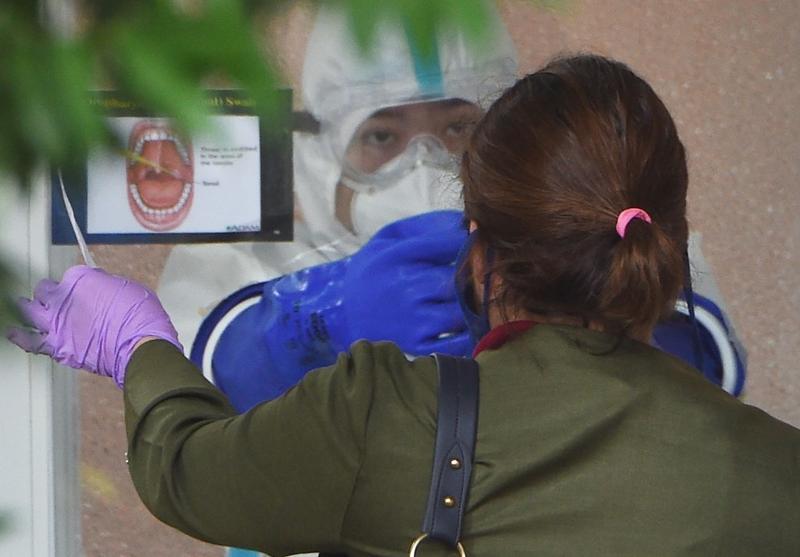 In this April 15, 2020 photo, a medical worker takes an oropharyngeal swab from a resident during a mass testing for the COVID-19 coronavirus at a park in Quezon City, suburban Manila. (TED ALJIBE / AFP)
In this April 15, 2020 photo, a medical worker takes an oropharyngeal swab from a resident during a mass testing for the COVID-19 coronavirus at a park in Quezon City, suburban Manila. (TED ALJIBE / AFP)
Marianne de Castro, a Filipino laboratory technician, believes that the COVID-19 pandemic has finally given millions of healthcare workers the attention they deserve.
In mid-March, as the number of COVID-19 cases continued to rise, Philippine President Rodrigo Duterte put the entire northern island of Luzon and the capital region of Metro Manila under community quarantine
Understandably, most people equate the word "frontliners" with doctors and nurses, but there are also workers behind the scenes who are providing essential services.
"We're the unsung heroes," De Castro said. She was alluding to the thousands of laboratory technicians who do the swab testing and analysis to determine if someone is COVID-19 positive.
"Most people think that it's just doctors and nurses who are doing the hard work. You often read news of doctors dying from COVID-19, or nurses getting infected with the novel coronavirus. But laboratory technicians are vulnerable to COVID-19 too," she said.
As the number of infected people in the Philippines rises, and as more people become aware of the necessity of being tested for COVID-19, De Castro noted that more people are realizing the key role being played by these workers.
ALSO READ: Philippines halts all overseas flights amid lockdown
The 40-something works as a laboratory technician at the Justice Jose Abad Santos General Hospital-one of the six hospitals managed by the city government of Manila.
In mid-March, as the number of COVID-19 cases continued to rise, Philippine President Rodrigo Duterte put the entire northern island of Luzon and the capital region of Metro Manila under community quarantine. It was also around this time that the government started enlisting all healthcare workers in its program to combat the novel coronavirus.
Nasal swab tests
De Castro has been working as a laboratory technician for more than a decade. One of the first things she did as a frontliner in this emergency was to train under the hospital's resident doctors in how to conduct nasal swab tests.
Already experienced in doing throat swabs for bacterial infections, De Castro was quick to learn. The first people she had to test in this case were her mother, sister and domestic helper, as the city government required all frontliners and their families to be tested for COVID-19.
De Castro said the hospital has temporarily closed its outpatient department and is now only open for emergency cases and maternity care. While some of her hospital colleagues go to local communities to provide outpatient services, De Castro stays in the hospital, conducting the mandatory nasal swab test on all pregnant women who come in.
De Castro's biggest fear personally, as a frontliner, is that she might infect her own mother-a 79-year-old diabetic."I don't mind if I'm the one who gets sick-as long as my mother is safe," she said.
READ MORE: Japan will not revive emergency as Tokyo COVID-19 cases rise
As a precaution, De Castro set up a makeshift shower room in their front yard. She takes a bath there as soon as she gets home. Her uniform must be soaked in a tub of water and disinfectant for a few hours before the helper can put it in the laundry machine for final washing. The whole family have to wear masks even inside their house.
Despite the stress and anxieties, De Castro is grateful for the appreciation being shown to the frontliners.
Rarely a day passes without some individual or organization sending free burgers, pizza and soda to all the hospital staff, and De Castro jokes that she is getting fat in her job.
While the city government provides free transportation and personal protective equipment to all workers, she said there are other organizations and individuals who still insist on giving the hospital a free supply of masks and medical gowns.


